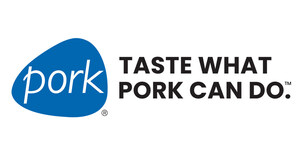
DES MOINES, Iowa, Nov. 6, 2019 /PRNewswire/ -- A new report from the National Pork Board digs into the growing short- and long-term protein needs facing China and how U.S. pork can position itself to meet that demand. The new report, Pork 2040: China Market Assessment, also reveals the impact that African swine fever (ASF) is having on both China's short- and long-term protein needs and how the Chinese pork industry and supply chain will change as a result.
The research study was conducted by Gira, a global research firm, using Pork Checkoff dollars and funds from the U.S. Department of Agriculture Foreign Agricultural Services Emerging Markets Program (EMP). It outlines critical insights that exporters of U.S. pork can use now to position themselves for long-term success in the Chinese market.
"Pork is a critical part of the Chinese diet with per capita consumption nearing 88 pounds* per person per year," said Norman Bessac, vice president of international marketing for the Checkoff. "This report will help exporters position U.S. pork as the supplier of choice, thereby building value for all U.S. pork producers."
According to the report, pork consumption in China peaked in 2014 and will continue to see a slow decline as the Chinese population grows to its highest level in 2030. As the availability of other proteins – specifically fish, chicken and beef – increases along with increased disposable income, consumers will look to diversify center-of-the-plate protein options.
According to the research, U.S. pork is poised to help fill the urgent short-term protein needs that ASF is creating in China due to the decrease in China's domestic pig population. However, by 2025 Chinese pork production will have rebounded, and farms will have had time to rebuild and become more modern. The report outlines key steps that pork exporters can take now to increase exports to China in the short-term and defines a strategy to meet long-term demands. A few highlights from the report include:
- Short-term – With the current ASF outbreak, the U.S. export industry will need to work hard to capitalize on the potential market share it can garner. The demand in the short term will be for pork cuts, variety meats and carcasses. Exporters also should use the benefit of time to build loyalty with both Chinese processors and consumers.
- Long-term – As 2025 approaches and Chinese domestic production rebounds, Chinese pork will replace most of the import growth seen during the ASF outbreak. However, U.S. exporters can use these next five years to build customer relationships, value around their products and to differentiate themselves as a preferred supplier in the long-term.
"The Pork Checkoff is committed to adding value for pork producers," said David Newman, a pig farmer representing Arkansas and president of the National Pork Board. "One of the ways to build value is to expand U.S. pork exports in developed and emerging markets. This market research and future studies will help key decision-makers to define and develop these markets."
The Pork Board has also created a free marketing toolkit, which includes ideas that U.S. pork exporters can use to build their business in China. The full report is available at pork.to/international. The Pork Checkoff collaborated with the U.S. Meat Export Federation and the National Pork Producers Council on the Pork 2040 study.
*Carcass Weight Equivalent (CWE)
The National Pork Board has responsibility for Checkoff-funded research, promotion and consumer information projects and for communicating with pork producers and the public. Through a legislative national Pork Checkoff, pork producers invest $0.40 for each $100 value of hogs sold. Importers of pork products contribute a like amount, based on a formula. The Pork Checkoff funds national and state programs in advertising, consumer information, retail and foodservice marketing, export market promotion, production improvement, science and technology, swine health, pork safety and sustainability and environmental management. For information on Checkoff-funded programs, pork producers can call the Pork Checkoff Service Center at (800) 456-7675 or check the Internet at www.pork.org.
Contact: Claire Masker-King
National Pork Board
[email protected]
515-223-2600
515-419-1805
SOURCE National Pork Board







Share this article